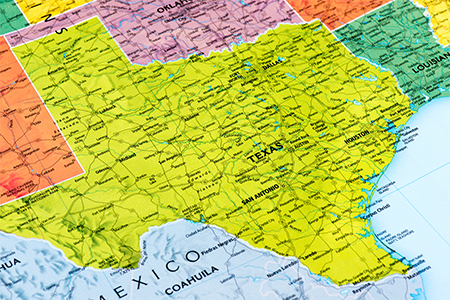You May Also Like
TEXAS CPA EXAM & LICENSE REQUIREMENTS 2024

Each state has its own criteria for licensure. Keep reading to learn how to become a CPA in Texas.
Nowadays, accountants have complicated software packages and other technologies to help keep track of money, inventories and taxation. However, clients still need the human touch to bring the proper skills and discernment in using those tools. If you are one of those who are embarking on a career in accountancy, you will want to learn more about becoming a Certified Public Accountant, as that state license is considered the very top of the field. Each state has its own criteria for licensure. Keep reading to learn how to become a CPA in Texas.
General Standards
Most states have requirements for education, CPA exam scores, ethics and experience. Texas is no exception. However, Texas does have unique rules and protocols for applicants who aspire to the lofty CPA credentials. The state does ask that you have 150 semester hours of undergraduate, or graduate work under your belt and that you have a Social Security Number. You needn’t be a US citizen nor an in-state resident.
Academic Standards
Upon embarking on the journey to a CPA license, first make sure that you school will be acknowledged by the Texas State Board of Public Accountancy. If you are attending a college or university in Texas, your academic advisor should have this information. Further, they should also be knowledgeable of the particular Board requirements for licensure. Do make sure that your institution is accredited by one of the following:
- Middle States Association of Colleges and Schools
- North Central Association of Colleges and Schools
- New England Association of Schools and Colleges
- Northwest Commission on Colleges and Universities
- Western Association of Schools and Colleges
- Southern Association of Colleges and Schools
The following school, and coursework types will not be acknowledged by the Texas Board:
- Technical/vocational schools
- Continuing Education courses–often not-for-credit
- CPA review courses
- Two-year colleges
- Correspondence and extension programs
- Community colleges–exceptions do apply and are noted
These colleges have accounting programs that will be acknowledged by the Texas Board:
- Mountain View Community College
- Lone Star College
- Houston Community College
- Austin Community College
If you earned credits from a foreign institution and wish for them to count towards your application, the Board will need to assess their worthiness for inclusion. Request a form by calling: (512)-305-7851 or by emailing exam@tsbpa.state.tx.us. Once you are assured to be in a suitable program/school, work with your academic advisor to ensure that you take the courses that the Board is looking for. Your transcripts will need to reflect the following: 30 semester hours of upper-level work including these subjects:
- Cost Accounting
- Auditing, Control and Risk-assessment
- Attestation
- Financial Accounting–up to nine hours of intermediate, advanced and theory
- Fraud Examination
- Public accounting
24 semester hours of upper-level business courses with no more than six hours in any one area, such as the following:
- Information systems
- Finance
- Statistics
- Marketing
- Economics
- Management
- Business Law
Complete a three semester hour board-approved ethics course Upon completion of your coursework, you can apply to sit for the CPA exam. You will need to include a passport-sized photo of yourself, all of your original transcripts and some other items so be sure to check the state’s website. Your packet, including the Board’s Application of Intent should be mailed to: Texas State Board of Public Accountancy 333 Guadalupe, Tower 3, Suite 900 Austin, TX 78701-3900 Once your materials have been approved, you will pay to take the sections of the test you desire to take first. From that point, you will have 90 days to sit for those sections. You can select one of Prometric’s Texas locations for taking your exam:
- Wichita Falls
- Abilene
- Lubbock
- Odessa
- Bedford
- Waco
- San Antonio
- Austin
- Dallas
The CPA exam is one of the most difficult professional tests available. You should consider extensive review prior to sitting for each section, as each has a near to 50 percent retake rate. The four sections are:
- Financial Accounting and Reporting
- Auditing and Attestation
- Regulation and Ethics
- Business Environment and Concepts
Once you pass the exam, you will need to pass an ethics-based exam covering the Texas Rules of Professional Conduct. This open-book exam will be emailed upon your successful completion of the CPA examination. Finally, you will need to prove yourself in the field. Texas requires 2,000 hours of paid, unpaid, full or part-time experience in accountancy under the direct supervision of a licensed CPA. You must demonstrate competency in some or all of the following areas:
- Accounting
- Attestation
- Management
- Financial Advisory
- Consulting
- Taxation
You may work in government, public accountancy, private industry, a law firm or academia. Keep diligent accounting of your time and experience and complete a Work Experience form and remit it to the Board. Once you have completed all phases of the CPA journey, you will be able to look for a job in Texas that best suits you and your career goals. To keep up-to-date on the Board’s rules, visit their website: Texas State Board of Public Accountancy.